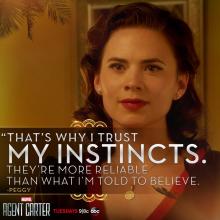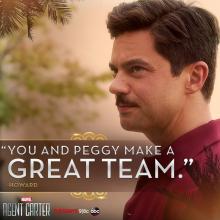inspiration + perspiration = invention :: T. Edison ::

Tonight was a change of pace from last week's big premiere, and its focus was squarely on that very issue: how do you keep momentum once you're made your mark? Perhaps more probing: how do you open up personally without clouding your judgement? What happens when the lines blur?
Evidence The SSR found plenty of evidence pointing the finger at Dr. Wilkes as a dirty Red spy, too much for Carter's tastes. Thompson arrived on orders to call the case closed, so Carter enlisted the aid of Howard Stark, fresh off the movie set. He identified this season's secretive cabal as the Arena Club (a group who keep their ranks "male and pale"). With his help and a bevy of young "production assistants," Carter infiltrated their headquarters and found evidence of election rigging and fraud.
Her inability to make off with the proof or plant a bug left her empty-handed when demanding that Thompson keep the case open. Afterwards, while cautioning against a go-it-alone attitude, Sousa noticed objects mysteriously floating around Carter. A quick check with Stark found that it wasn't Carter at all, but the missing Dr. Wilkes, pushed into another wavelength of the light spectrum by Zero Matter. Stark and Wilkes worked on a solution while Carter set her sights on Frost. Sousa dug into records back at the SSR (avoiding Thompson in the process).
Frost's new Zero Matter scratch and Carter's interrogation combined to put the pressure on the starlet. She turned on the charm when convincing her husband to hire an assassin for Carter, but also proved vulnerable to fear and uncertainty. Her final moments in the episode revealed an even more harrowing side effect of Zero Matter, one that is sure to haunt her and the entire cast.
Analysis In this episode, our heroine continued have the right instincts about the case, but slipped back into old habits. It's clear from the opening shot that Carter's grief and guilt over Wilkes's apparent death are not gone, just tightly controlled. When she comes up against Thompson's opposition, those emotions harden into anger, aloofness, and distrust.
Last season Carter certainly bent the rules to help out a friend, but also had the restraint to recognize said friend's own foibles and responsibility. In "Better Angels," that perspective is lost. It's possible she keeps personal walls up because the few times they've gone down, she's unable to maneuver the emotional landscape with her usual surety.
Certainly, Thompson's actions in this episode don't help matters any. His insecurities are fully on display as he refuses to listen to the reports of his fellow agents, pushing back with equal hardness every time his judgement is questioned. There are still glimpses of his conflicted loyalties (he watches the Zero Matter footage despite orders not to). In front of his partners and subordinates, though, he has nothing but disdain for their work. Compare his method of handling disputes with Sousa's from last week, where he listened, took all views into account, but asserted his authority when needed to keep the case moving forward. However good an investigator Thompson may yet prove himself to be (and I do have hope yet), he's proven how little qualified he is to lead his fellow agents.
Sousa's personal instincts are with Carter: he doubts the Communist evidence and believes Isodyne has more to hide. But he's more than an agent this season, he's also a leader, despite not being treated so by Thompson. He has to balance professional responsibilities with his own feelings, and is just as annoyed at Carter's intransience as with Thompson's interference. He represents a middle way of cooperative action: Carter and Thompson may be on different sides of the argument, but their emotional reactions to doubt and uncertainty are unfortunately mirrored.

Howard Stark is a welcome returning "menace" (as dubbed by the eventually revealed Dr. Wilkes). However, he ironically provides some of the episode's most heartfelt as well as humorous moments. He doesn't just seek to fix Dr. Wilkes on his own, but accepts the other scientist's help. He recognizes that Jarvis and Carter make a good team and wonders if he'll need to find a new butler without a hint of self-pity. When it becomes clear the issue is over both his and Dr. Wilkes's heads, Stark rushes to find the best mind for the job. He's still arrogant, but doesn't allow those emotions to get in the way of the work that needs doing.
We see another dark turn for the increasingly villainous Frost, who doesn't trust anyone, even her husband, with her new secret. Her answer to questioning is either coy manipulation or fearful attacks: it's kill or be killed in Frost's mind, and she intends to be the last lady standing. Yet we also see the toll such a double life takes as she grows increasingly frustrated and tired, and finally terrified by what she is becoming. There's no room in Frost's life for true companionship. Soon, there may be no room for people at all.
Perhaps the best subtle message about teamwork came from the thwarted assassination attempt. Blinded by anger and self-recrimination, Carter didn't notice the man until it was nearly too late, barely escaping his clutches. Jarvis rushed to her aid in a neat echo of last week's comic wrestling bout, and the two working in tandem achieved victory. His presence didn't diminish her own; instead, the two proved that everyone, even heroes, need a helping hand now and again.
What did you think: are Carter's instincts always right? Will Thompson come around? What part will Bernard the flamingo play next? Let me know any and all theories in the comments. You can also read all my live tweets from Agent Carter and other shows over at Storify.





